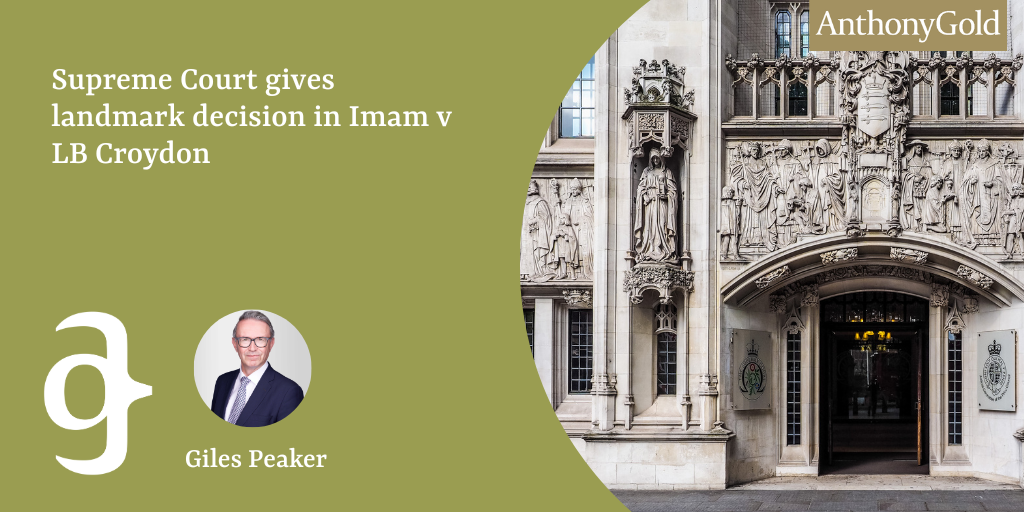Supreme Court gives landmark decision in Imam v LB Croydon

In a significant victory for homeless applicants, the Supreme Court has recently delivered a landmark judgment in the case of R (on the application of Imam) v London Borough of Croydon [2023] UKSC 45. The decision, handed down on 28th November 2023, addresses the crucial issue of whether a council’s lack of resources can serve as a valid excuse for failing to fulfil its duties to homeless individuals.
Giles Peaker, a partner at Anthony Gold, played a crucial role in representing Crisis as an intervenor in this case. His expertise, combined with the legal counsel provided by Justin Bates, Harriet Wakeman, and Barney McCay of Landmark Chambers, contributed to the successful outcome of the appeal.
The Case:
This case revolves around the court’s approach to granting a mandatory order as a remedy against a local housing authority, specifically Croydon, which breached its statutory duty under section 193(2) of the Housing Act 1996. This duty requires the authority to ensure suitable housing for individuals eligible for assistance. Croydon acknowledges its breach but argues that severe budget constraints and limited housing stock justify not immediately providing a suitable property to Ms Imam, who is the respondent.
The key issue in the appeal is whether and how constraints on the resources of a local housing authority should influence the court’s discretion in determining the remedy for a breach of section 193(2) of the Act.
The First Judgment:
The judge determined that Croydon breached its statutory duty under section 193(2) of the Housing Act 1996 and considered whether to issue a mandatory order for Croydon to provide suitable accommodation to Ms Imam within six weeks.
The judge, in exercising discretion, declined to issue such an order, citing various factors. These included the lack of evidence on the severity of Ms Imam’s difficulties at her current property, acknowledgment by Croydon of its breach, efforts made by Croydon to address deficiencies, a general shortage of accommodation, and budgetary constraints.
Court of Appeal
The Court of Appeal partially allowed Ms Imam’s appeal, stating that the judge erred in considering general budgetary constraints and in analysing Croydon’s efforts.
Croydon appealed to the Supreme Court.
Key Points from the Supreme Court Judgment:
- Lack of Resources is not a Blanket Excuse: The Supreme Court emphatically stated that simply claiming a lack of resources does not constitute a valid reason for a council to evade its responsibilities towards homeless individuals. This decision underscores the importance of upholding the rights of those in need, even in the face of financial constraints.
- Croydon’s Appeal Dismissed: In a decisive outcome, the Supreme Court dismissed Croydon’s appeal. This decision sets a precedent for future cases and reinforces the obligation of local councils to prioritise their duties to homeless applicants, irrespective of financial challenges.
Conclusion:
The Supreme Court’s judgment in Imam v LB Croydon is a significant milestone in the ongoing efforts to protect the rights of homeless individuals. This landmark ruling marks a positive step towards ensuring that local authorities are held accountable for their obligations to the most vulnerable members of society.
The case was remitted to the High Court for further consideration on whether a mandatory order should be made. For further details and the complete Supreme Court judgment, please refer to the official case law: Supreme Court Judgment – Imam v LB Croydon.

No comments